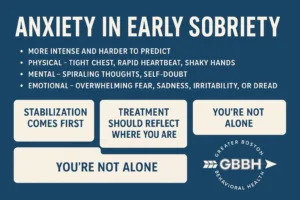You’ve put the bottle down. Or maybe you’re still circling the decision, asking yourself if life might feel easier, lighter, clearer without alcohol. Either way, you’re thinking about change—and somewhere in that early stretch, anxiety starts showing up in ways you didn’t expect.
It’s not a sign that sobriety isn’t for you. It’s not proof that drinking was the only thing that worked. It’s your body and mind learning how to feel again—raw, unfiltered, unmedicated.
At Greater Boston Behavioral Health, we walk with people in exactly this place. The early stage. The uncertain zone. The part where you’re asking, “How do I handle the anxiety now that I’m not numbing it?”
This guide is for you. Because treatment can help—and healing can hold.
Why Anxiety Feels Worse in Early Sobriety
Many people use alcohol to soften anxiety long before they realize that’s what they’re doing. That glass of wine before a social event? That nightly drink to unwind? That slow sip to take the edge off a racing brain?
It worked—until it didn’t. And now that you’re sober or sober-curious, your brain is trying to regulate without its usual shortcut.
That spike in anxiety isn’t a failure. It’s a physiological response.
In early sobriety, anxiety may feel:
- More intense and harder to predict
- Physical—tight chest, rapid heartbeat, shaky hands
- Mental—spiraling thoughts, self-doubt, racing worries
- Emotional—overwhelming fear, sadness, irritability, or dread
Understanding that this is normal makes a difference. You’re not broken. You’re adjusting.
Stabilization Comes First
When everything feels intense, your only job is this: stabilize.
In therapy, stabilization is the phase where we prioritize safety over insight. That means we don’t dig deep right away. We help you stay grounded, day to day, breath by breath.
Some stabilization strategies include:
- Consistent sleep: Going to bed and waking up at the same time daily
- Nutrition: Eating at regular intervals, avoiding sugar crashes
- Hydration: Drinking enough water to support brain function
- Movement: Gentle walks, stretching, or yoga—not intensity, just flow
- Connection: Talking to someone who gets it, even briefly
Early sobriety isn’t the time for perfection. It’s the time for presence.
Treatment Should Reflect Where You Are—Not Where Others Think You Should Be
Some people imagine therapy as this deep, intense process of excavation. And sometimes, that’s true—later on. But early anxiety treatment in sobriety should feel supportive, not overwhelming.
At Greater Boston Behavioral Health, we use multiple therapeutic options depending on where you are emotionally, physically, and mentally. You don’t have to “be ready” in the traditional sense. We’re ready for wherever you are.
Treatment might focus on:
- Grounding your nervous system
- Identifying what triggers your anxiety now that substances are gone
- Replacing old coping mechanisms with new ones
- Gently reframing intrusive or anxious thoughts
- Learning to sit with emotion without needing to escape it
Looking for Anxiety Treatment in Boston, MA? We meet people where they are—not where they’re expected to be.
Your Nervous System Is Learning Safety—And That Takes Time
Early sobriety is like turning all the lights on in a room you’ve been sitting in the dark. It’s disorienting. And your nervous system is on high alert.
Anxiety treatment helps reduce that baseline alertness so you’re not constantly bracing for something bad. We use techniques that support regulation before asking you to process emotions you’re not ready to hold.
You might learn:
- Box breathing or paced breathing to calm your fight-or-flight response
- Body scans to notice where anxiety lives in you
- Anchoring exercises to stay present when your mind runs away
- Self-talk patterns that help de-escalate intrusive thoughts
It’s about teaching your body it’s safe—even when it doesn’t feel that way yet.
You’re Not Alone: Many People Feel Lost Without Their Old Coping Tool
Alcohol might’ve numbed your fear, dulled your pain, or helped you survive socially. Letting it go means you’re now sitting with the things it used to cover.
That’s brave—and it’s also deeply uncomfortable.
Anxiety treatment gives you a bridge. It helps you navigate this no-man’s-land between how things were and how you want them to be. It doesn’t ask you to jump into full vulnerability right away. It simply gives you space to find your footing.
Looking for Anxiety Treatment in Wellesley, MA? Let us be part of that bridge.
What a Good Treatment Fit Looks Like in Early Sobriety
A therapist or program that understands early sobriety and anxiety won’t:
- Push you to disclose everything in the first session
- Focus only on your “drinking story”
- Dismiss your anxiety as “just withdrawal”
- Rush you through a recovery checklist
Instead, they will:
- Listen to what you need—emotionally, physically, spiritually
- Offer concrete tools without overwhelming you
- Help you understand the why behind your anxiety
- Normalize what you’re experiencing without minimizing it
You deserve care that holds your whole story—not just the part that looks clinical.
When Sobriety and Anxiety Collide, Here’s What Works
You don’t need to wait until you’re falling apart to start treatment. In fact, the earlier you begin, the more support you’ll have to navigate the emotional curveballs.
We often help clients develop:
- A weekly routine that balances structure and flexibility
- A plan for high-risk moments (Friday night, family stress, loneliness)
- A vocabulary for naming their feelings instead of numbing them
- A relapse prevention strategy that includes anxiety management
- A sense of self that isn’t rooted in shame
The goal isn’t perfection. It’s clarity, calm, and control.
You’re Allowed to Ask for Help—Again and Again
This isn’t your one shot. You don’t need to “get it right” the first time. And you’re not weak if you need extra help in early sobriety.
Anxiety is tricky. It can tell you you’re failing even when you’re growing. It can whisper, You’ll never feel okay again, even when healing is happening beneath the surface.
That’s why support matters.
If you’ve tried therapy before and it didn’t work, it might not have been the right fit or timing. That doesn’t mean you’re unhelpable. It means your journey is still unfolding.
FAQs About Anxiety Treatment in Early Sobriety
Is anxiety normal in early sobriety?
Yes. It’s extremely common for anxiety to spike when substances are removed, especially if you were using them to self-medicate. The good news? It gets better—with support.
What if I’m not ready to commit to long-term therapy?
That’s okay. We offer flexible treatment options that meet you where you are. Even a few supportive sessions can make a difference in how you feel.
Will therapy conflict with my sobriety or recovery group?
No. Therapy can complement your recovery work. We collaborate with your goals, not against them.
I feel like I should be ‘better’ by now—why am I still anxious?
Healing doesn’t follow a schedule. Just because you’re sober doesn’t mean anxiety disappears. Treatment helps you manage what’s still lingering underneath.
Can I switch therapists if I don’t feel connected?
Absolutely. Finding the right fit is crucial. We want you to feel safe and seen, and we support your choice to change if needed.
Take the Next Step—You Don’t Have to Do This Alone
Call (888) 450-3097 or visit our Anxiety Treatment services in Boston, Massachusetts to learn more. You’re already doing the hard part: choosing a new way forward. Let us help you keep going—steadier, supported, and stronger.


